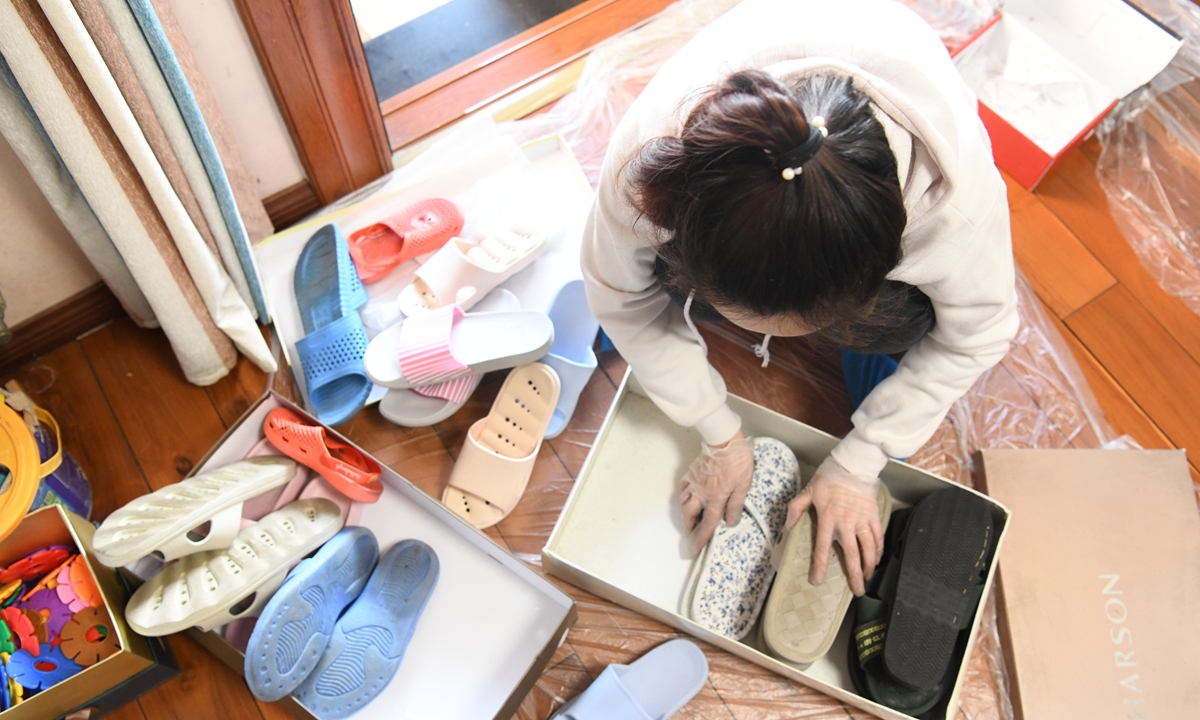ARTS / CULTURE & LEISURE
Young people leave office life behind as gig economy grows in China
No strings attached

A dog walker takes his client's pet out for a walk in Chengdu, Southwest China's Sichuan Province, on March 17, 2022. Photo: VCG

A girl helps store shoes for a client in Wuhan, Central China's Hubei Province, on January 13, 2022. Photo: VCG
If you asked young Chinese today what their dream job is, they may answer with a number of new occupations you have probably never heard of before, such as scriptwriter for interactive murder mystery experiences, virtual artist, shopping assistant or sleep hotline operator. All these jobs have something in common: Besides being relatively new, they free people from having to work from morning to night in an office and give them the flexibility to enjoy life's many other pursuits.According to a report by Ali Research, there will be an estimated 400 million freelancers working in the gig economy in China by 2036.
"Professions like package delivery people, programmers and food delivery drivers were all new and unfamiliar to job hunters dozens of years ago, but now these have become common. The same will happen with these new professions. They are on the rise in response to the times and the development of the internet and will offer more opportunities to young Chinese people," Ding Daoshi, a veteran independent analyst in the internet sector, told the Global Times on Sunday.
Charm of e-commerce
These new professions spawned by new market demand are growing in popularity among young Chinese.
According to China Central Television, a 23-year-old woman living in South China's Guangdong Province earns 40,000 yuan ($6,287) a month creating virtual avatars for games and social media platforms.
The report shocked lots of netizens, causing them to stand up and take notice of this new profession.
At a time when the concept of the metaverse has exploded, creators of virtual avatars can be said to be the first batch of workers in this new industry as virtual avatars are in high demand among netizens who want to establish a second identity for themselves in virtual society.
The creators sell their original works through online shops on e-commerce platforms. E-commerce platforms haven't created opportunities just for artists, sleep hotline operators are also finding and building connections with clients through these channels.
"I didn't realize I had such potential until my friends once randomly brought up that my voice is really good for doing ASMR," said Mingo, who tries to help clients fall asleep as a part-time job, told the Global Times.
"At the time I started in 2020, ASMR was a popular trend on social media. So, that made me start looking for people who need such services on Douban.
"I think this job probably suits me because I'm really into sociology and I like to listen to people's stories. It has developed my ability to understand people's problems and find the root cause behind them," he said.
Mingo mentioned that this part-time job has also improved his performance at his main job as a writer.
"The best thing about this job is I can learn a lot from people's stories and they provide inspiration for me when I write my essays and novels."
Li Xiaorong, 35, who struggled at a traditional internet company, found new life at a job as a professional organizer who helps get people's homes in perfect order.
Facing rooms containing thousands of things messily stacked in piles, Li is able to rapidly come up with an organization plan and, after a few days, these cluttered rooms become organized, giving the entire apartment a completely new look.
The trend toward flexible employment has broadened the possibilities for young people to achieve work-life balance and also fits in with their more liberal view toward what makes a successful career.
Room for improvement
Wu works full time as a "ladder," a person whom people hire to play multiplayer games with them so they can level up faster. Over the past three years, she has managed to establish a fixed and stable group of clients for herself, although she says she had her fair share of trouble at the beginning such as being tricked out of money by clients or running into clients who refused to pay for her services.
"The profession requires me to be on standby all the time. If someone needs a ladder player, I have to log in immediately. And, since I am a woman, I run into trouble as some people have a bias toward females and think we cannot play these games well," Wu said.
Mingo mentioned that a lack of clients and the unstable nature of her income can also be the problems.
"I don't work every day, because as an independent worker, I don't have too many clients. This month so far, I only had two clients.
"And they have been booking sessions with me for a long time, so we are friends now. One of them is a girl; she always shares her confusions about her love relationships with me. We talked for two hours last Friday," Mingo added. Ding pointed out that many of these new professions are still not that well known and so lack of unified standards and a system for evaluating performance. As such, promising jobs such as AI testers still need further improvement




